In Greek mythology, Hermes is among the most popular of the Olympian deities, who was later appropriated as the Roman God Mercury. Referred to as the ‘divine trickster’, Hermes is a playful mischief making God, known for his quick wit, practical jokes and musical talent. For the mortals he is the protector of shepherds, thieves, merchants and travelers, and the God of eloquence, commerce, cunning, astronomy and music. The image of Hermes evolved and varied along with Greek art and culture. In Archaic Greece (up-till 480 BC), he is usually depicted as a mature man, bearded, and dressed as a traveler or a herald, while later depictions mostly depict him to be an athletic young man without a beard. Hermes’ main symbol is the caduceus, a winged staff intertwined with two snakes. Other items associated with him include the herma (pile of stones, markers, possibly from where his name is derived), the tortoise, the satchel or pouch, winged sandals and helmet and the olive tree. Hermes, the herald of the Gods, is also a great inventor. He is attributed for the invention of the alphabet, numbers, measures and weights. He is the patron of athletes, gymnasts and the God of the art of fighting. Hermes is also among the few Olympians who has access to the Underworld, as the guide of the dead souls helping them into their afterlife. A refreshing character, Hermes thus finds himself among numerous interesting Greek stories. Know more of the Greek trickster God of the cunning with the 10 most famous myths featuring Hermes.
#1 Zeus And Maia
Maia was the eldest of the seven Pleiades; daughters of the Titan Atlas and the Oceanid Pleione. These nymphs were the virgin attendants of Artemis (goddess of the hunt and the moon), and were renowned for their beauty. This attracted the attention of many male Gods and Maia being the most beautiful of the Pleiades was lusted after by none other than Zeus, the King of the Olympians. According to the Homeric Hymn to Hermes, Maia was a shy nymph who avoided the company of the Gods. An intrigued Zeus came after her while his wife Hera slept, and raped her in a secluded cave on Mount Cyllene in Arcadia, where the nymph had hid herself. The event led to Maia becoming impregnated with Hermes, a child that she delivered after the passing of 10 moon cycles in the same cave.

#2 The Lyre
Being the son of Zeus and Maia, Hermes was not born an ordinary child and would soon earn quite a reputation among the Gods. Still a newly born infant, Hermes crawled out of his cradle while his mother still lay asleep. As he ventured out of the cave, Hermes came across a turtle waddling by and chewing on the thick grass in front of the dwelling. This was the fortunate event for the great inventor that would be Hermes. The mischievous child picked up the creature with both hands and carried his lovely toy into the house. Then turning her over he scooped out the marrow from her mountain shell. Knowing exactly what he was doing, he cut stalks of reed to measure, fitted them through the shell, and fastened their ends across the back. Finally tightening the piece with cowhide and fixing a yoke, he stretched across seven sheep-gut strings and completed his first invention, the musical Lyre. Some myths say that he then went on to compose his first song, a hymn in celebration of his own birth.
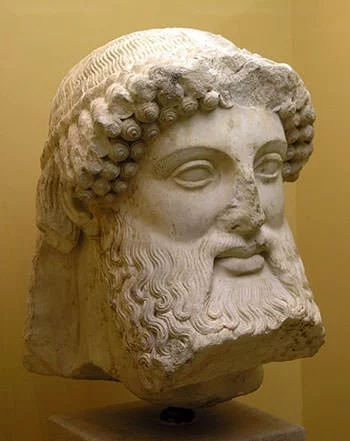
#3 Stealing Apollo’s Cattle
Among the most recounted myths surrounding Hermes is the one regarding his first theft, of Apollo’s cattle. Growing up rapidly on the day of his birth and inventing the Lyre in a few hours, Hermes found himself to be hungry. Venturing out in search of food and some mischief, the ‘divine trickster’ made his way to Thessaly, where he came upon Apollo’s (God of War) herd. Hermes was quick to steal 50 of his half-brother’s cattle and made his way back while carefully covering his tracks. Hermes made wicker sandals for himself to disguise his footprints, while he made the cows walk backwards to confuse anyone who came after them. Also being witnessed by an old man named Battos on his way, Hermes promised the farmer a plentiful crop and a good vintage in exchange for keeping the secret of his theft.
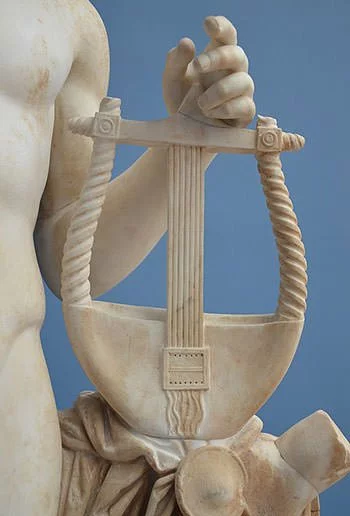
Hermes sacrificed two of the animals in the fire, skinned them and hid the rest of the heard. Satiated now he returned to his cradle where Maia discovered his mischief and reproofed him for his thievery from the Gods. She was right and Apollo arrived soon looking for his lost herd, guided by Battos, and Zeus in some myths. The God of war confronted Maia and the young Hermes, and finally the matter was taken to Zeus on Mount Olympus. Standing before the god of rule and law, Apollo told the story of how he had tracked down the thief. Hermes defended himself playing his tricks, proclaiming his innocence with elaborate lies and outlandish oaths. Zeus who could see through the child’s stories was amused at the quick witted child, feeling affection for his mischievous offspring. The God laughed and offered the young Hermes a place among the great Gods of Olympus, provided he returned Apollo’s stolen cattle first. Hermes obliged; returning the remaining herd and offered his newly crafted lyre to Apollo for the 2 cows he had sacrificed.
#4 Hermes And Hera
The queen of the Olympians and the wife of Zeus, Hera was enraged at her husbands philandering ways. She had a temper and was infamous for making life extremely difficult for Zeus’ lovers and their offspring’s. Being the God of cunning, Hermes was aware even as an infant to better have Hera as an ally than as an enemy. So once he disguised himself as Hera’s son Ares and crawled on to the Goddess’ lap. Unaware of the trickery, Hera took the child in her arms and breastfed him, thus making him into her foster son. Being treated as a foster mother by Hermes, Hera was obliged to treat him as her son, thus bringing an end for any chances of enmity among the two.
#5 Slayer of Argus
In Greek myths Argus Panoptes was a hundred-eyed giant who was the servant of Hera, the Queen of Olympus. His name “Panoptes” meant “the all-seeing one” and his defining task was to guard the white heifer Io from Zeus. Io was a mortal Argive princess, and priestess of the Goddess Hera in the city of Argos. She was noticed and pursued by Zeus who fell in love with her. Hera came to know of the affair and as she tried to catch the lovers, Zeus transformed Io into a white cow. Hera was however not deceived and demanded Zeus to give her the cow as a present. Hera then tied the cow to an Olive tree and sent Argus to watch Io and keep her away from Zeus. Argus had a hundred eyes all over his body, and he only closed half of them at a time. A depressed Zeus finally turned to Hermes for help. The helpful God Hermes came to Zeus’ rescue and disguised himself as a shepherd. He then lulled the fearsome giant to sleep with his song and music and then proceeded to kill him. Zeus was then able to free the white heifer Io.
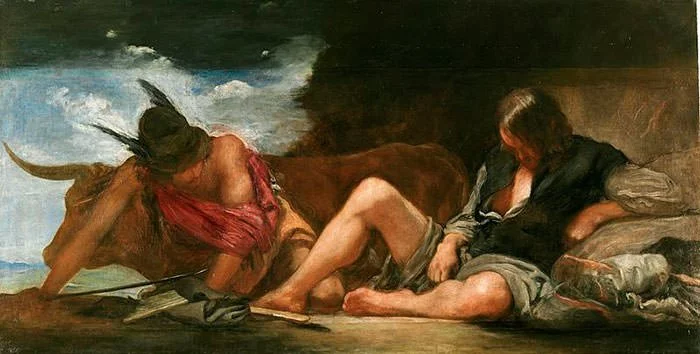
#6 Hermes And Aphrodite
Hermes was among the several admirers of Aphrodite (Roman Goddess Venus), but when the Goddess of beauty rejected his advances, Hermes became greatly depressed and disheartened. Looking at the grim condition of the playful and mischievous Hermes, Zeus pitied him and decided to help. Once when Aphrodite was bathing in the river Achelous, Zeus sent an eagle to lift her sandal and take it to Amythaonia of the Egyptians, and hand it over to Hermes. When Aphrodite finally came seeking for her sandal, Hermes seduced her in exchange for returning the sandal and obtained his desire with her. He then rewarded the eagle by putting it in the sky where it became the constellation Aqtilla.
#7 Hermes And Ares
Ephialtes and Otus were the sons of Poseidon (God of the Sea) with Iphimedia, wife of Aloeus. The twin brothers were powerful giants full of arrogance, which often made them troublesome for the Gods. Once Ephialtes and Otus decided on and succeeded in kidnapping Ares (the God of War), or as per a different myth captured him when he tried to stop them from climbing Mount Olympus. Anyway Ares ended up being locked away in a cauldron for 13 months, and it was the wily Hermes who finally discovered where Ares was and rescued him. In another brief story regarding a Naiad nymph, Hermes and Ares were involved in a boxing match. Tanagra was the daughter of river God Asopus and Metope. Tanagra was the Naiad Nymph of the spring, well or fountain (like her mother) and had both Hermes and Ares as her suitors. To decide her partner both the Gods agreed on fighting a boxing match. Hermes won the duel and lay with Tanagra. Her name was given to the town in Baeotia (Central Greece) where Hermes carried her off.
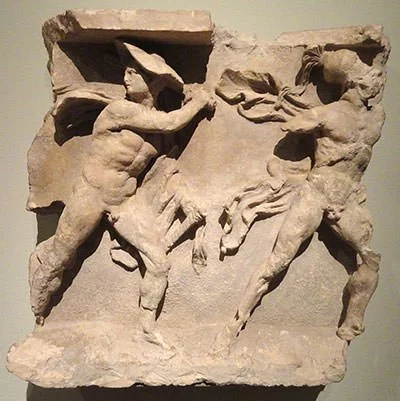
#8 Guider of Souls
Hermes, the messenger to the God, is also tasked with being a psychopomp or “conductor of souls”. He thus guides the souls of the deceased to the Underworld. With the help of the Caduceus, the golden staff gifted to him by Apollo, Hermes shows the souls the way to the Underworld, guiding them from earth to the River Styx. Once they made it to the river, they are taken on a boat further into the Underworld by the boat master Charon.
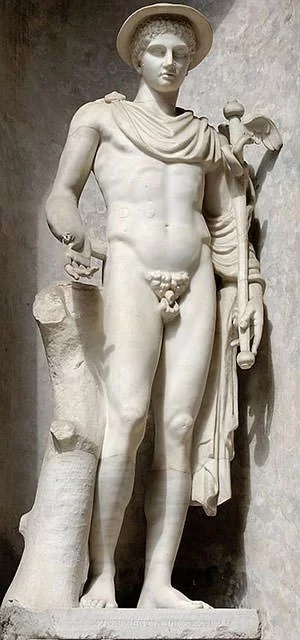
#9 Hermes And Pandora
Pandora was the first mortal woman made by the smithing God Hephaestus from clay and water, on the command of Zeus himself. Pandora was Zeus’ revenge on mankind. She was blessed by the Gods; Athena taught her weaving and needlework; Aphrodite, the goddess of love and beauty, blessed her with beauty; and Apollo, the god of music, gave her mastery over music. But it was Hermes, the god of cunning who gave her an inquisitive mind and deceitful nature. The blessing of Hermes would play a vital role in Pandora opening her gift from the Gods, the jar that would unleash all the miseries upon mankind.
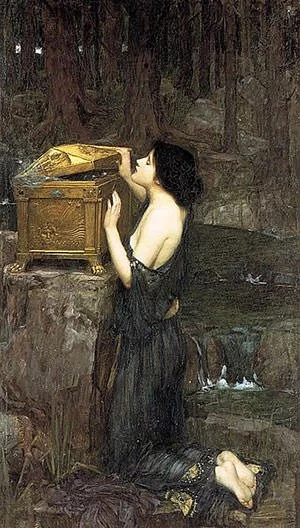
#10 Hermes And The Heroes
Odysseus
In the 10 year long journey of Odysseus following the Trojan war, the Hero is greatly benefited by his two meetings with Hermes. On the first occasion when the enchantress Circe has developed a liking for Odysseus and lays a trap for him, Hermes gives Odysseus a special herb that protects the Hero from Circe’s spells. Another time when Odysseus is forced to stay with the nymph Calypso for seven years, it is Hermes who arrives with Zeus’ message for Calypso, commanding her to let Odysseus go home.
Perseus
When the Greek hero Perseus was travelling to find Medusa, Hermes came forward and warned Perseus that the task he was on was incredibly dangerous but possible. Hermes not only guided Perseus as to where the Gorgons lived, but also gave him items to help in the quest, like the golden sword that would be able to cut through Medusa’s neck, the leather bag to carry her head in and the pair of winged sandals that would allow Perseus to fly.
Heracles
During the 12th and final labor of the Greek hero Heracles, he was asked to do the impossible task of retrieving the three headed dog Cerberus from the Underworld and bringing him back to King Eurystheus. He was helped in this task by Hermes and Athena, who led the Hero to the River Styx from where he proceeded to the Underworld in the boat of Charon.

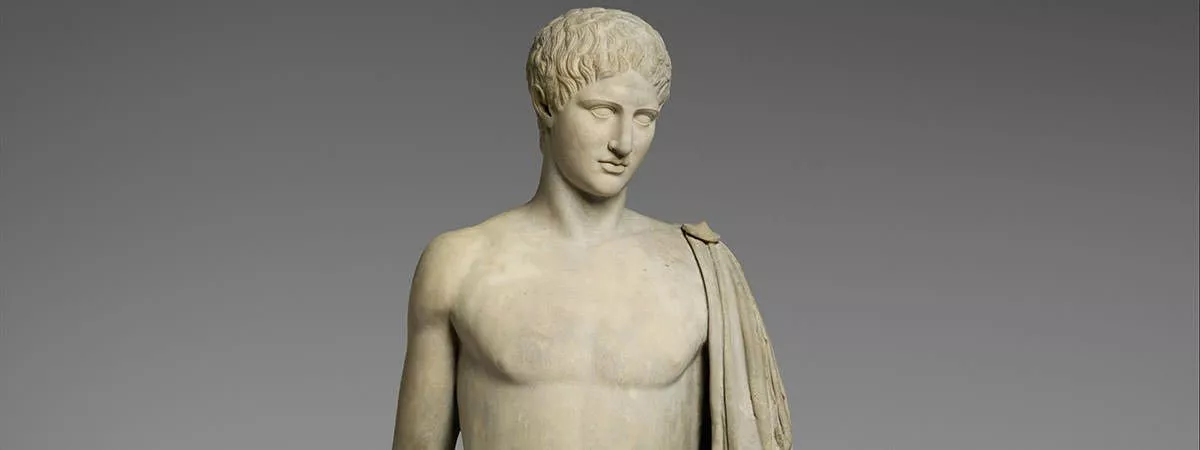
This was awesome thank you
You’re welcome.